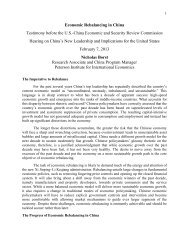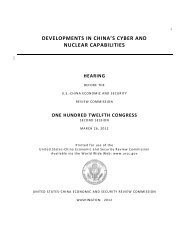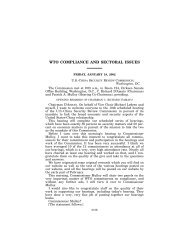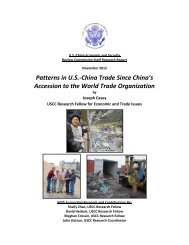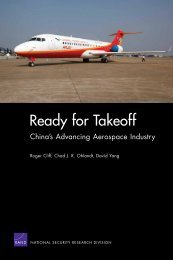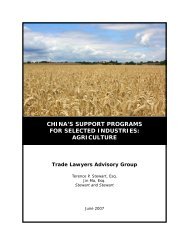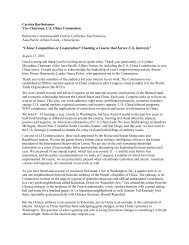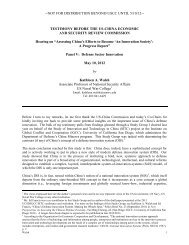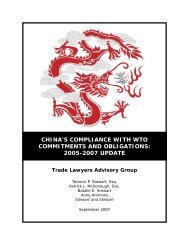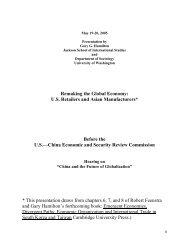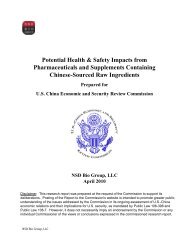2011 report to congress - U.S.-China Economic and Security Review ...
2011 report to congress - U.S.-China Economic and Security Review ...
2011 report to congress - U.S.-China Economic and Security Review ...
You also want an ePaper? Increase the reach of your titles
YUMPU automatically turns print PDFs into web optimized ePapers that Google loves.
dkrause on DSKHT7XVN1PROD with $$_JOB266small groups <strong>to</strong> coordinate <strong>and</strong> direct local foreign relations.‡ 128Many provincial leaders also are powerful ac<strong>to</strong>rs in the central government,<strong>and</strong> currently provincial leaders hold two of the nineseats on the Politburo St<strong>and</strong>ing Committee <strong>and</strong> ten of 25 Politburoseats.§Under the stewardship of central government ministries, Chineseprovinces are empowered <strong>to</strong> be economic liaisons <strong>and</strong> internationaldealmakers, fulfilling <strong>China</strong>’s ‘‘going out’’ strategy* <strong>and</strong> creatingeconomic growth locally. Provincial leaders are responsible for creating<strong>and</strong> implementing local foreign trade strategies <strong>and</strong> managingprovincial SOEs. 129 Border provinces such as Jilin <strong>and</strong>Liaoning (opposite North Korea), <strong>and</strong> Yunnan (opposite Burma,Laos, <strong>and</strong> Vietnam) create <strong>and</strong> implement policies <strong>to</strong> foster economicengagement across their borders, often with heavy political<strong>and</strong> financial support from the central government. Jilin is a leadingac<strong>to</strong>r in support of <strong>China</strong>’s engagement policy <strong>to</strong>ward NorthKorea. The province invests in open border cities, economic cooperationzones, joint ventures, <strong>and</strong> cross-border infrastructure <strong>and</strong>aims <strong>to</strong> advance national policies <strong>to</strong> secure resources, createwealth, <strong>and</strong> promote economic stability across the border.† 130Yunnan Province has similar trade-liberalizing policies along itsborder with Vietnam <strong>and</strong> Burma. 131 Reflecting on Yunnan’s role asan integral link <strong>to</strong> <strong>China</strong>’s southern neighbors, President Hu<strong>to</strong>ured Yunnan in 2009 <strong>and</strong> declared the province a ‘‘bridgehead’’for <strong>China</strong>’s relations with South <strong>and</strong> Southeast Asia, a pronouncementthat inspired widespread investments in infrastructure <strong>and</strong>commerce under the banner of a new ‘‘bridgehead strategy.’’ 132The provinces also are agents of <strong>China</strong>’s foreign policies related<strong>to</strong> security <strong>and</strong> defense, pursuing regional security goals, <strong>and</strong> maintaininginternal <strong>and</strong> external stability along <strong>China</strong>’s borders. Thisis especially the case in regard <strong>to</strong> North Korea, which could createa problem for <strong>China</strong> in the event of a human security disaster (includingthe possibility of refugees flooding in<strong>to</strong> <strong>China</strong>). In such acase, provincial <strong>and</strong> local officials would be responsible for the‡ Provincial-level management of foreign relations under governors <strong>and</strong> provincial party secretariesis conducted by provincial Foreign Affairs Offices <strong>and</strong> Foreign Trade <strong>and</strong> <strong>Economic</strong> CooperationCommissions, which manage foreign diplomatic relations <strong>and</strong> foreign trade relations,respectively. Chen Zhimin, ‘‘Coastal Provinces <strong>and</strong> <strong>China</strong>’s Foreign Policy-making,’’ in Yifan Hao<strong>and</strong> Lin Su, eds., <strong>China</strong>’s Foreign Policy Making: Societal Force <strong>and</strong> Chinese American Policy(Aldershot, UK: Ashgate Publishing Limited, 2005), pp. 11–12. http://www.cewp.fudan.edu.cn/attachments/article/68/Chen%20Zhimin,%20Coastal%20Provinces%20<strong>and</strong>%20<strong>China</strong>%27s%20Foreign%20Policy%20Making.pdf.§ Liaoning <strong>and</strong> Shanghai are represented in the Politburo St<strong>and</strong>ing Committee; Beijing,Tianjin, Jiangsu, Hubei, Guangdong, Xinjiang, <strong>and</strong> Chongqing are represented in the Politburo.Linda Jakobson <strong>and</strong> Dean Knox, New Foreign Policy Ac<strong>to</strong>rs in <strong>China</strong> (S<strong>to</strong>ckholm, Sweden:S<strong>to</strong>ckholm International Peace Research Institute (SIPRI), Policy Paper 26, September 2010),p. 32. http://books.sipri.org/files/PP/SIPRIPP26.pdf.* <strong>China</strong>’s ‘‘going out’’ strategy was formally enunciated in 2002 by then Chinese PresidentJiang Zemin as a strategy <strong>to</strong> help <strong>China</strong> open up <strong>to</strong> the world, economically <strong>and</strong> diplomatically.U.S.–<strong>China</strong> <strong>Economic</strong> <strong>and</strong> <strong>Security</strong> <strong>Review</strong> Commission, 2008 Annual Report <strong>to</strong> Congress (Washing<strong>to</strong>n,DC: U.S. Government Printing Office, November 2, 2008), p. 236.† Jilin represents 38 percent of <strong>China</strong>’s accumulated foreign direct investment (FDI) <strong>to</strong> NorthKorea since 2000, <strong>and</strong> North Korea is the province’s fourth-largest trading partner. While thisheavy investment has contributed <strong>to</strong> economic growth in Jilin, it also makes Jilin particularlyvulnerable <strong>to</strong> North Korea’s unpredictable suspensions of cross-border trade. Bloomberg News,‘‘‘Dead Border’ Is Price of <strong>China</strong> Support for North Korea Regime,’’ June 14, 2010. http://www.bloomberg.com/news/2010–06–14/-dead-border-thwarts-growth-as-chinese-pay-price-for-backing-north-korea.html;Carla Freeman <strong>and</strong> Drew Thompson, <strong>China</strong> on the Edge: <strong>China</strong>’s BorderProvinces <strong>and</strong> Chinese <strong>Security</strong> Policy (Washing<strong>to</strong>n, DC: The Center for the National Interest<strong>and</strong> The Johns Hopkins School for Advanced International Studies, April <strong>2011</strong>), pp. 36–39. http://www.cftni.org/<strong>China</strong>_on_the_Edge_April_<strong>2011</strong>.pdf.VerDate Nov 24 2008 13:46 Nov 10, <strong>2011</strong> Jkt 067464 PO 00000 Frm 00278 Fmt 6601 Sfmt 6601 G:\GSDD\USCC\<strong>2011</strong>\067464.XXX 067464



